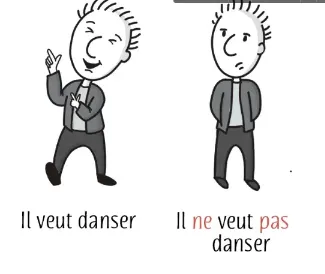12 - Negation
Basic negation
Simple structure: ne + verb + pas (e.g., Je ne parle pas = “I don’t speak”).

- Je suis etudiant → I’m a student
- Je ne suis pas etudiant → I’m not a student
Note that when the verb begins with a vowel, ne contracts into n' and it's added to the verb, like this:
- J’aime les chats → I love cats
- Je n’aime pas les chats → I don’t love cats
Negation words
These special negation words follow the general structure of (ne + verb + negative word).
Structure: Ne + verb + negative word (e.g., ne…jamais, ne…rien). Personne can also be the subject (Personne ne vient = Nobody comes).
- jamais (never, nunca):
- Je ne vais jamais à Paris = (I never go to Paris, Nunca voy a París.)
- rien (nothing, nada):
- Il ne fait rien aujourd’hui = (He does nothing today, No hace nada hoy.)
- personne (nobody, nadie):
- Personne ne parle maintenant = (Nobody speaks now, Nadie habla ahora.)
- plus (no more/no longer, ya no):
- Nous ne travaillons plus tard = (We no longer work late, Ya no trabajamos tarde.)
| Negative Word | English | Spanish Equivalent | Example Sentence |
|---|---|---|---|
| ne…pas | not | no | Je ne parle pas français. (I don’t speak French.) |
| ne…jamais | never | nunca | Je ne vais jamais à Paris. (I never go to Paris.) |
| ne…rien | nothing | nada | Il ne fait rien aujourd’hui. (He does nothing today.) |
| Personne ne | nobody | nadie | Personne ne parle maintenant. (Nobody speaks now.) |
| ne…plus | no more | ya no | Nous ne travaillons plus tard. (We no longer work late.) |
pas encore
The “pas encore” combination in a negative sentence means “not yet” and can be used like so:
tip
Keep in mind the liason, pronouncing the "s" in "pas encore" as a soft "z"
- Je n'ai pas encore mangé = I haven't eaten yet
- Je ne les ai pas encore mangé = I haven't eaten them yet
- Ne l'as-tu pas cuisiné ? = Haven't you cooked it?
- Ne l'as-tu pas encore cuisiné ? = Haven't you cooked it yet?
Casual Speech
In casual speech, the “ne” is often omitted, leaving only the negative words “pas, jamais, rien” as the indicators of a negative statement.